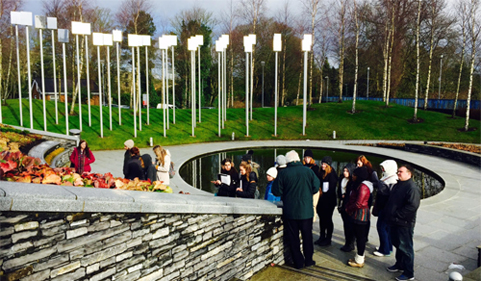
Students visit the Omagh bombing memorial site with Michael Gallagher, chairperson of the Omagh Self Help and Support Group. Gallagher advocates nationally and internationally for a public inquiry into the bombing.
Join Program Director Dr. Haley Duschinski, Associate Professor of Anthropology, and Larry Hayman, Esq., CLJC Pre-Law Advisor, for a virtual information session on Oct.20 from 10 to 11 a.m. The trip plans to resume in Spring 2022.
- Join the Oct. 20 session.
- Read more about past students’ experiences on the trip.
- Read more about research associated with the trip.
This 3-credit hour course, ANTH 4620, is open to students in all majors and departments. It counts toward the Anthropology major requirements, the Law, Justice & Culture Certificate, War and Peace Major and Certificate program, and the Social Science requirement in the College of Arts & Sciences.
Graduate students may apply for the graduate section, ANTH 5620, for 4 credit hours.
About Human Rights, Law & Justice in Northern Ireland
The course focuses on post-conflict transition, dealing with the past, contested memories, and the legacy of human rights abuses for various sections of Northern Ireland society.
Today, Northern Ireland is going through a cultural and artistic renaissance as it emerges from decades of conflict, resistance, and armed struggle known locally as “the Troubles.”
This border region also experiencing uncertainty and change associated with Brexit.
This spring break study abroad program offers students the unique opportunity to explore human rights, law, and justice through an intensive nine-day study abroad experience in post-conflict Belfast, the capital city of Northern Ireland.
The program includes interactions with former combatants including IRA and UVF soldiers, human rights lawyers, ex-political prisoners, victims associations, and restorative justice practitioners, as well as visits to museums, former prisons, and non-governmental organizations.
Through interactions with local scholars, social activists, students, and human rights groups, students gain firsthand knowledge of peacekeeping and peace-building, human rights and peace activism, and the politics of truth, justice, and reconciliation in post-conflict Northern Ireland.
For more information, contact Professor Duschinski at duschins@ohio.edu or visit the Office of Global Opportunities for the Northern Ireland program.


















Comments